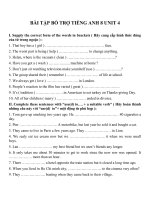Bài tập môn tiếng anh lớp 8 (40)
Bạn đang xem bản rút gọn của tài liệu. Xem và tải ngay bản đầy đủ của tài liệu tại đây (82.28 KB, 3 trang )
BÀI TẬP BỔ TRỢ TIẾNG ANH 8 UNIT 9
I. Fill in the blanks with the correct forms of the words (Điền hình thức đúng của từ
vào khoảng trống):
Pediatrics, branch of medicine, that comprises the care and (1) (treat) ………………… of
the diseases o childhood and the study of normal (2) (grow) ……………………. .
Pediatrics became a specialty in the 20th century. In 1980s some pediatricians began a
subspecialty called adolescent (3) (medical) ………………………… , which deals with
the special (4) (medicine) ………………… and emotional needs of persons between the
ages of (5) (approximate) ………………………….. 12 and 20 years.
Pediatricians are trained to recognize congenital defects (see Birth Defects) and to treat
them when possible. One (6) (importance) ……………………. Treatable class of these
conditions
is
congenital
heart
malformations;
sur-gical
(7)
(correct)
………………………… of these defects has become increasingly (8) (success)
……………………………… .
New words:
- Pediatrics (n): khoa nhi
- Comprise (v): gồm có, bao gồm
- Pediatrician (n): bác sĩ nhi khoa
- Adolescent (adj): đnag tuổi thanh niên, trẻ
- Congenital (adj): bẩm sinh
- Defect (n): nhựoc điểm, khuyết điểm
- Malformation (n): tật, dị tật
II. Put the following sentences into their correct order to make a meaningful reading
(Hãy sắp xếp những câu sau thành một bài đọc có nghĩa):
1. In ancient Idia, the Hindus surgically treated bone fractures and removed bladder
stones, tumors, and infected tonils.
2. Operations such as castration (the removal of a male’s testicles); lithotomy (the
removal of stones from the bladder); and amputation (the surgical removal of a limb or
other body part) are also believed to have been performed by the Egyptians.
3. Using skin flaps from the forehead, Hindu surgeons shped new noses and ears for the
punished criminals.
4. Trepanning, a procedure in which a hole is drilled in the skull to relieve pressure on the
brain, may have been performed as early as 8000 BC.
5. They are also credited with having develop plastic surgery as early as 2000 BC in
response to the punishment of cutting off a person’s nose or ears forcertain criminal
offenses.
6. In the 4th century BC, the Greek physician Hippocrates published descriptions of
various surgical procedures , such as the treatment of fractures and skull injuries, with
directions for the proper placement of the surgeon’s hands during these operations.
7. The first surgical procedures were performed in th Neolithic Age (about 10,000 to
6000 BC).
8. Ancient Egyptian medical texts have been found that provide instructions for many
surgical procedures including repairing a broken bone and mending a serious wound.
9. In Egypt, carvings dating to 2500 BC describe surgical circumcision – the removal of
foreskin from the penis and the clitoris from female genitalia.
New words:
- Neolithic Age (n): thời kì đồ đá mới
- trepan (v): khoan (xương sọ)
- carving (n): nghệ thuật khắc, chạm
- circumcision (n): sự cắt bao qui đầu
- foreskin (n): bao qui đầu
- castration (n): sự thiến
- testicle (n): tinh hoàn
- lithotomy (n):thuật cắt sỏi
- bladder (n): bàng quang
- amputation (n): thuật cắt cụt
- tumor (n): khối u, u , u bướu
- tonsil (n): amidan
Offense (n): sự vi phạm, sự phạm tội
III. Read the reading below carefully and then translate it into Vietnamese (Hãy đọc
kĩ bài đọc sau, rồi dịch sang tiếng Việt):
HISTORY OF SURGERY
During the 16th, 17th, and 18th centuries, many discoveries in surgical practice took
place. Much credit belongs to the French surgeon Ambroise Paré, often called the father
of mdern surgery. Paré successfully employed the method of ligating, or tying off,
arteries to control bleed, thus eliminating the old method of cauterizing, or searing, the
bleeding part with a red-hot iron or boiling oil. Discoveries about functions of the human
body also helped make surgery a more accurate science during this period. For example,
the English physical and anatomist William Harvey discovered the prosess of blood
circulation and Italian anatomist Marcello Malpighi identified the existence of tiny blood
vessels called capillaries that carry blood from the major blood vessels to the cells of the
body. John Hunter, a British anatomist and surgeon, stressed the close relationship
between medicine and surgey and performed many experimental operations that
advanced the practice of surgery.









